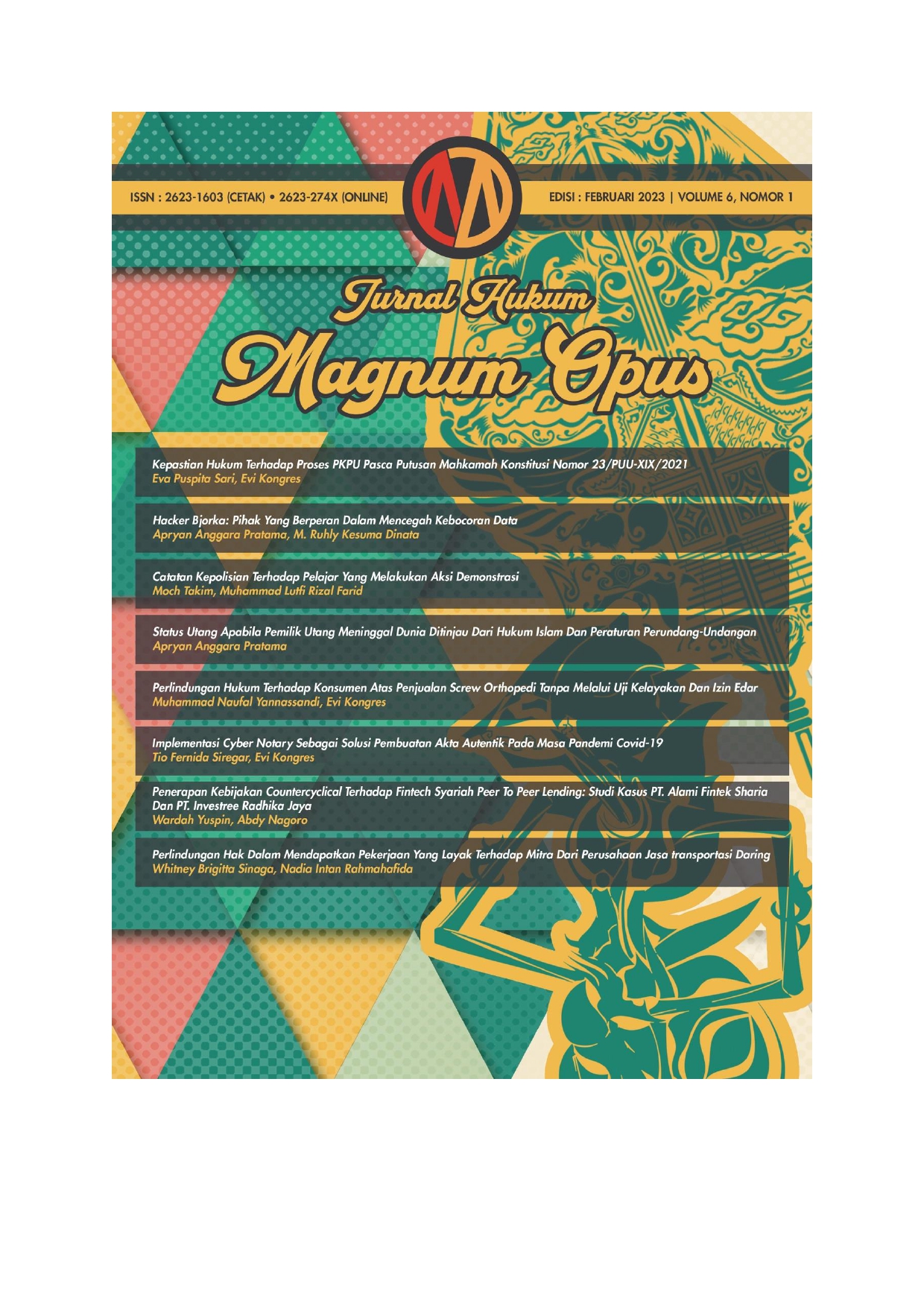Perlindungan Hak dalam Mendapatkan Pekerjaan yang Layak terhadap Mitra dari Perusahaan Jasa Transportasi Daring
DOI:
https://doi.org/10.30996/jhmo.v6i1.7420Abstract
This research aims to analyze and study legal protection and human rights for partners of online transportation service companies using normative juridical methods with a conceptual approach and a statutory approach. The novelty of this research with previous research is thatthis research discusses the legal position of partners in online motorcycle taxi companies and legal and human rights protection for online motorcycle taxi partners. Therefore, it can seem from the nature of the cooperative relationship, Go-Jek's partners are unattached by the employment agreement regulated in Article 1 number 15 concerning Law No.13/2003 so there is no mechanism for systematic wage distribution. The existence of Law No.13/2003 protects many basic rights that are fundamental to workers' lives. However, Law No.13/2003 is still limited to workers whose considered official employees in a company, whose legal protection is still unclear in protecting human rights caused by other people so that people can relish all the rights granted by law. On the other hand, the state also should protect these rights legally and within the system set out in the United Nations Guiding Principles on Business and Human Rights (UNGPs) and In theICESCR Convention in article 6 paragraph (2). Therefore, legislation is indeed a needed main problem in solving a case. The government can review Law No.13/2003 by widening the range of types of workers, nor clarifying the definitions and requirements of elements that canclassify workers into types the contracts.
Keywords: human rights; legal protection; partner position; transportation service
Abstrak
Penelitian ini bertujuan untuk menganalisis dan mengkaji perlindungan hukum dan hak asasi manusia terhadap mitra dari perusahaan jasa transportasi daring dengan menggunakan metode yuridis normatif dengan pendekatan konseptual dan pendekatan perundang-undangan. Kebaruan dari penelitian ini dengan penelitian terdahulu yakni penelitian ini membahas mengenai kedudukan hukum mitra pada perusahaan ojek daring serta perlindungan hukum dan HAM terhadap mitra ojek daring. Oleh karena itu, terlihat dari sifat hubungan kerjasamanya, para mitra Go-Jek tidak terikat dengan perjanjian kerja yang diatur dalam Pasal 1 angka 15 tentang UU No.13 Tahun 2003 sehingga tidak ada mekanisme pembagian upah yang sistematis. Keberadaan UU No.13/2003 melindungi banyak hak dasar yang mendasar bagi kehidupan pekerja. Namun, UU No.13/2003 masih terbatas pada pekerja yang dianggap pegawai resmi di suatu perusahaan, yang belum jelas perlindungan hukumnya dalam melindungi hak asasi manusia yang disebabkan oleh orang lain agar masyarakat dapat menikmati semua hak yang diberikan oleh undang-undang. Di sisi lain, negara juga memiliki kewajiban untuk melindungi hak-hak tersebut secara hukum dandalam sistem yang diatur dalam United Nations Guiding Principles on Business and Human Rights (UNGPs) dan Pasal 6 ayat (2) ICESCR. Oleh karena itu, perundang-undangan memang menjadi masalah utama yang dibutuhkan dalam menyelesaikan suatu perkara. Pemerintah dapat mengkaji ulang UU No.13/2003dengan memperluas jenis pekerja, serta mengklarifikasi definisi dan persyaratan elemen yang dapat mengklasifikasikan pekerja ke dalamjenis kontrak yang ada.
Kata kunci: hak asasi manusia; jasa transportasi; kedudukan mitra; perlindungan hukum
Downloads
Downloads
Published
Issue
Section
License
Authors who publish with Jurnal Hukum Magnum Opus agree to the following terms:
- Authors transfer the copyright and grant the journal right of first publication with the work simultaneously licensed under a Creative Commons Attribution-ShareAlike 4.0 International License.. that allows others to share the work with an acknowledgement of the work's authorship and initial publication in this journal.
- Authors are able to enter into separate, additional contractual arrangements for the non-exclusive distribution of the journal's published version of the work (e.g., post it to an institutional repository or publish it in a book), with an acknowledgement of its initial publication in this journal.
- Authors are permitted and encouraged to post their work online (e.g., in institutional repositories or on their website) prior to and during the submission process, as it can lead to productive exchanges, as well as earlier and greater citation of published work (See The Effect of Open Access)













